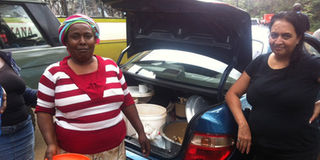Women’s big hearts keep forces fighting

Ms Nancy Njeri (stripped top), Ms Kirt Hirubhai Patel after handing free food to an unnamed soldier near Westgate Mall on Monday. Photo/DANIEL KALINAKI
What you need to know:
- Keen to contribute to efforts to rescue fellow countrymen, they prepared free food for fighters
- Terror attack has built bridges over racial, social, political and economic divides
By the time construction of Westgate Mall started, Nancy Njeri was already selling tea and snacks in Nairobi’s Westlands area.
She saw the towering mall rise, brick by brick, from 2003 until its completion. And while the rich flocked the mall for its cappuccinos and lattes, Njeri, 49, continued to sell tea and mandazi (snacks) to construction workers and other low-income earners in the neighbourhood.
After gunmen attacked Westgate on Saturday morning, Njeri, a mother of seven, had only one thing on her mind — how to keep feeding her customers and security officials who turned up to help with the rescue effort. Only, this time, her food is for free.
Njeri’s story is just one of many about ordinary people making small but important contributions after the terror attack on the upscale mall, whose official death toll climbed to 62 on Monday.
Many have queued to give blood. Others have sent money. Njeri has given free food and her time — with a smile.
“I know this place has been destroyed, but it will be rebuilt,” Njeri, short and plump, said, as she ladled out food to a couple of policemen on duty.
“Surely the ones who will rebuild it will still need to eat and drink. I will still be here.” Her kindness and generosity are infectious.
Yesterday morning, Kirt Hirubhai Patel drove to Westgate in search of ways in which she could be of help.
She approached onlookers, but none was willing to join her. Then she met Njeri and Ann Wambui, who were giving out tea and mandazi, and who agreed to help her.
CURIOUS ONLOOKERS
She put the two women in to her car, went shopping for food, then went to her house near Westlands, and whipped up a quick meal of flavoured rice, cabbage, and a vegetable broth of tomato, carrots and potatoes.
Soon the three women were back at Westgate. And with smoke billowing behind them from a fire at the mall, and gunshots ringing out all around them, they served food to policemen, soldiers, private security guards, and journalists who were covering the siege.
As police beat back curious onlookers and fired tear gas, the three women worked furiously, passing around heaped plates of food, just 200 metres away from snipers lurking in the mall.
“You don’t have to be rich to give,” said Ms Patel, who was born in Kisumu and returned from the UK four years ago to take care of her ailing parents.
Ms Patel’s father passed on two years ago. She rarely lets her 85-year-old mother out of her sight. So she had brought her along and the old woman sat quietly in the front seat of the small Toyota, as the three women served the food.
As gunshots rang out in the mall and police helicopters roared overhead, Ms Patel was concerned, not with her personal safety or that of her mother, but with the welfare of the troops fighting their way into the mall.
“Those people have been working for more than 24 hours,” she said, pointing across a narrow ravine, to the soldiers crouching against the walls of the smouldering mall, trying to stay out of sight of the snipers inside.
“I feel sorry for them; they’ve been sitting there for hours without food. I wish I could get it over to them.”
The Westgate tragedy has cost many lives and caused a lot of pain. But it has also brought together the most unlikely people and built bridges over racial, political and socio-economic divides.
From the meeting between leaders to this chance meeting between Ms Patel from the UK and Ms Njeri from the sprawling Kariobangi slums in Eastlands, terror has brought Kenyans together, not driven them apart.





